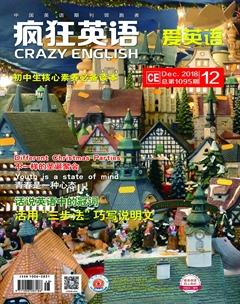过去完成时态的判定方法
罗焕慧
◎要点概述
过去完成时用来描述主语在某一过去时间或行为之前就已经完成了的动作或状态,侧重于其在过去的过去时间里对某事造成的某种影响或结果。过去完成时由“助动词had(用于各种人称和数)+过去分词”构成。
掌握这个时态的关键点在于理解主语动作或状态发生的时间是“过去的过去”。下面我们来学习三种判定过去完成时的方法:
一、从时间状语来判定
一般来说,各种时态都有特定的时间状语。与过去完成时连用的时间状语有以下几种:
1.by + 过去的时间点。例如:
①I had finished reading the novel by nine o?蒺clock last night.到昨晚九点,我已经看完这本小说了。
②By the time of yesterday, we had gotten more than ten thousand letters.到昨天为止,我们已经收到了一万多封信件。
2.by the end of + 过去的时间点。例如:
①We had learned over two thousand English words by the end of last term.到上学期末,我们已经学了两千多个英语单词。
②By the end of last week, they had completed the new bridge.到上周末,他们已经完成了这座新桥。
3.before + 过去的时间点。例如:
①They had planted six hundred trees before last Wednesday.在上星期三之前,他们已经种了六百棵树了。
②My uncle had never been to Shanghai before I was born.在我出生前,我舅舅从未到过上海。
二、由“过去的过去”作判定
过去完成时表示“过去的过去”,是指在过去某一动作之前就已经发生或完成的动作,即动作有先后关系,动作在前的用过去完成时,在后的用一般过去时。这种用法可根据以下来判定:
1.从宾语从句中判断
当宾语从句的主句为一般过去时,且从句的动作先于主句的动作时,从句要用过去完成时。过去完成时通常出现在told、 said、 asked、 knew、 heard、 thought等动词后的宾语从句中。例如:
①He said that his wife had seen the film before.他说他妻子已经看过这部电影了。
②She asked me where I had been during the summer holidays.她问我暑假去了哪里。
2.从状语从句中判断
在时间、条件、原因和方式等状语从句中,主、从句的动作发生有先后关系,动作在前的,要用过去完成时,动作在后的要用一般过去时。例如:
①After he had finished his homework, he went to bed.做完作業后,他上床睡觉了。
②I had been at the bus stop for 20 minutes when a bus finally came.当车来的时候,我在车站已经等了20分钟。
【注意】由before、after引导时间状语从句时,若主、从句表示的动作紧密相连,则主、从句都用一般过去时。例如:
①After he closed the door, he left the classroom.他关上门离开了教室。
②Henry visited New York before he left for Washington.亨利去华盛顿前游览了纽约。
3.从定语从句中判断
在含有定语从句的主从复合句中叙述过去的事情,先发生的动作用过去完成时。例如:
①She found the key that she had lost.她找到了丢失的钥匙。
②Linda wanted to use the umbrella that her mother had bought for her before.琳达想要用她妈妈以前给她买的那把雨伞。
4.在固定句型中判断
过去完成时还可用在hardly...when...,no sooner...than...,It was the first / second / ...time(that)...,It was...since...等固定句型中。例如:
①Hardly had John begun to speak when the audience interrupted him.约翰刚开始演讲,听众就打断了他。
②No sooner had he arrived than he went away again.他刚到就又走了。
③It was the third time that he had been out of work that year.这是他那一年的第三次失业了。
5.从意向性动词上判断
表示意向的动词如hope、 wish、 expect、 want、 think、 intend、 mean、 suppose等,用过去完成时表示“原本……,未能……”。例如:
①We had hoped that you would come, but you didn?蒺t. 我们原本希望你来,但你没有来。
②Peter had meant that he could give his wife a surprise.彼得原本打算给妻子一个惊喜。
三、根据上下文去判定
当人们叙述过去发生的事情,在已叙述了过去发生的事情后,反过来追述或补述以前发生的动作时,常用过去完成时。例如:
①I met Wang Tao in the street yesterday. We hadn?蒺t seen each other since he went to Beijing.我昨天在街上遇见了王滔。自从他去北京后,我们都没有见过面。
②Last week I talked with my cousin about my favorite novel Pride and Prejudice. It so happened that she said she had read it before.上周我和表姐谈起我最喜欢的小说《傲慢与偏见》。真巧了,她说她以前正好也读过。
◎贴身小练
一、用所给动词的适当形式填空。
1.The old man (help) twelve kids return to school by the year of 2010.
2.We (intend) to help but could not get there in time.
3.I returned the book that I (borrow).
4.She didn?蒺t go to bed until she (finish) her work.
5.He said he (work) in that factory since 1949.
6.By nine o?蒺clock last night, we (get) 200 pictures from the spaceship.
7.When I woke up, it (not stop) raining yet.
8.I thought I (send) the letter a week before.
9.Hardly she (leave) home when the telephone rang.
10.Mr. Green died yesterday. He (be) a good friend of mine.
二、根据所给的汉语,完成英语句子。
11.在我父母昨天到家时,我已经煮好了晚饭。
By the time my parents yesterday, I the dinner already.
12.他一到,天就下起雪来了。
Hardly he when it to snow.
13.在我们搬进去之前我们已经把房子油漆过了。
We the house before we
.
14.我们惊讶于她所做的一切。
We at what she
already.
15.汤姆说这本书他已经读过两遍了。
Tom he the book twice.
16.她没通过考试,因为她没准备好她的功课。
She didn?蒺t the exams because she her lessons well.
17.他告訴我们他已经把那本书给了他兄弟。
He us that he the book to his brother.
18.这是他第一次迟到。
This the first time he
late.

